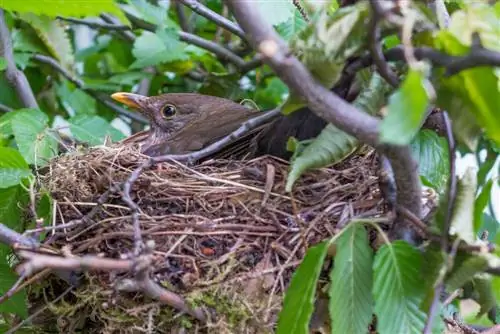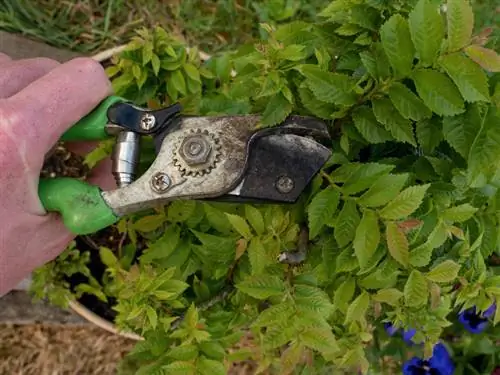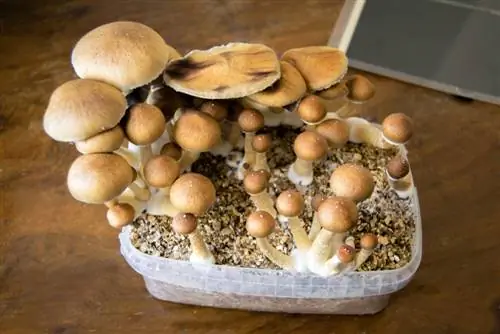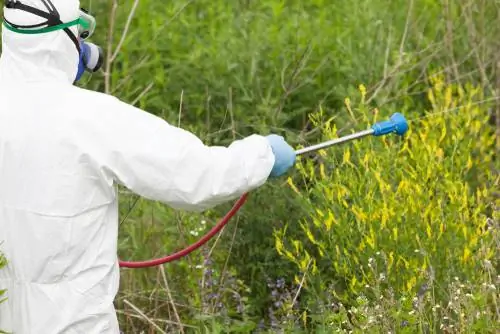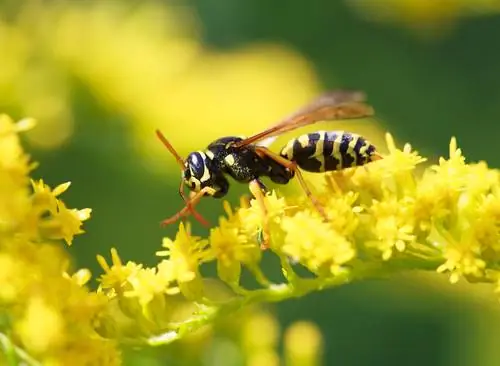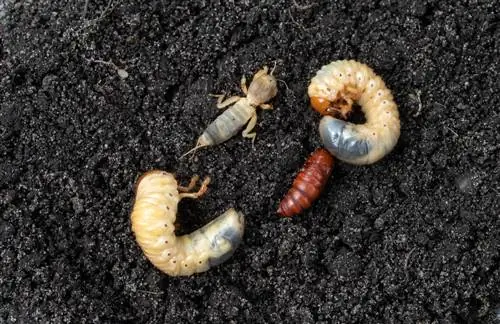- Author admin leonars@hobbygardeners.com.
- Public 2023-12-16 16:46.
- Last modified 2025-06-01 06:02.
The blackbird (Turdus merula), unmistakable due to its size and characteristic coloring, is one of the most common European breeding bird species. It is estimated that between 40 and 80 million pairs of birds prefer to raise their young near human settlements.
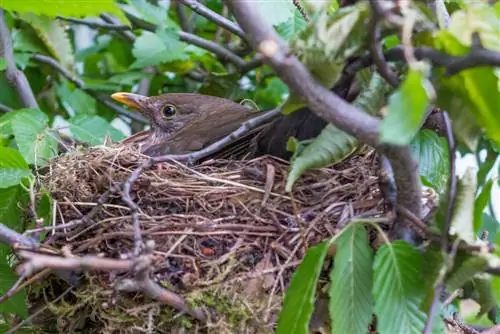
When is the blackbird breeding season?
The blackbird's breeding season often begins at the end of February and extends into August. During this time, blackbirds usually raise two to five broods, with only the female breeding and both adult birds caring for the young birds.
- Blackbirds breed very early in the year, breeding season often begins at the end of February
- Only the female blackbird breeds, the young birds are cared for by both adult birds
- usually two to five broods per year, often so-called box broods
- Breeding season extends into August
- Blackbirds are resident birds and often use the nest in winter
Courtship and nest building
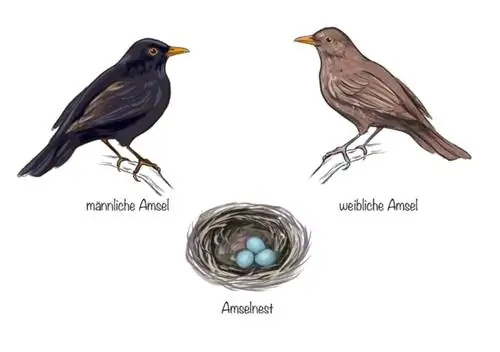
Blackbirds reach sexual maturity at the age of one year - so last year's chicks will breed in the next season. This haste is also necessary because, with an average age of four to five years, wild blackbirds do not live particularly long - but in human care, the animals can live up to 20 years.
In late winter or early winter, the male's courtship around the female begins, which is shown by the characteristic song and the impressive step that can be observed - high upright and fluffy stride. After mating, the future blackbird parents look for a suitable nesting place, with the nest being built solely by the female.
Excursus
Melodic singing
You can also recognize blackbirds by their characteristic, melodic song. This sounds flute-like and is often performed from an elevated position. If there is danger (e.g. if someone approaches the nest) you will hear a loud scolding.
When and how long do blackbirds breed?
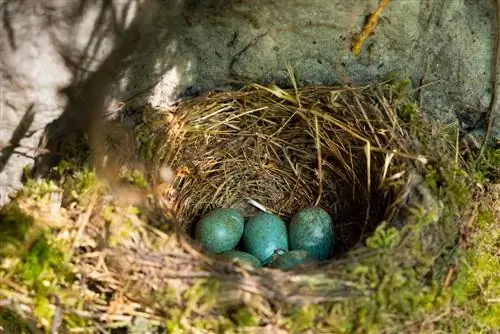
Blackbird nests can often be seen at the end of February
“Don’t take young birds home that appear to be abandoned, they will still be fed by their parents!”
Blackbirds begin to breed very early in the year: from the end of February, the female lays up to six often bluish, sometimes brownish eggs in the nest that was previously built within a few days from moist earth, blades of grass, twigs and other materials. The female blackbird lays one egg per day, from which the chicks hatch one after the other after around two weeks of incubation.
- only the female blackbird breeds
- The hatched chicks stay in the nest for about two weeks
- then they leave, but stay nearby and are fed
- this time will last around three weeks
- Nestlings are fed by both adults
- After leaving the nest, often only the male blackbird feeds
Once the young birds have left the nest, the female blackbird often begins the next brood - the birds raise between two and five, sometimes even six, clutches of eggs per year until August. The blackbird pair often stays together over this one season.
Excursus
The blackbird - a typical cultural follower
Originally, the blackbird was primarily at home in dense forests. However, around 150 years ago, songbirds began to invade gardens and other human habitats. Today they are mainly found in larger settlements and large cities - the food supply is better and the birds are better protected from predators. Blackbirds find suitable nesting places in bushes and trees, even on balconies, and short-grass lawns also offer favorable conditions for foraging.
Frequently asked questions
How do I make my garden breeding-friendly for blackbirds?
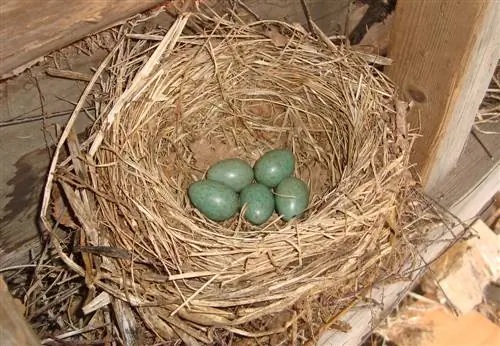
Nesting sites must be quiet and protected
Blackbirds generally do not breed in nest boxes, but they like to nest in dense hedges and trees. Nests are often found in conifer or beech hedges, but other plantings - such as the geranium box on the balcony - are also welcome, as long as it is quiet there and the birds are not disturbed much. You should also keep the garden free of pesticides and other toxic plant protection products so that the animals can find enough food. A lawn or meadow also provides blackbirds with food.
How often do blackbirds breed in the same nest?
The female blackbird often uses the nest built in spring for further broods. In any case, it breeds about two to four times a year, with the next brood often already beginning when the last chicks are still being fed by the father blackbird. The biologist calls this behavior box breeding.
What enemies threaten blackbirds?
Blackbirds have many enemies: birds of prey, but also magpies and crows target songbirds. Young birds that have fledged are often inexperienced and careless; they fall victim to the aforementioned predators, but also cats and foxes. The nests are often plundered by magpies and squirrels.
What do blackbirds eat?
Blackbirds are extremely soft food eaters whose diet consists largely of worms and beetles. They look for these on the ground - often after a downpour, after which the breeding female also leaves the nest for a short time. Blackbirds also eat berries and fruits, such as mountain ash, cornelian cherries, crabapples and elderberries. Planting such bushes in the garden provides food and hiding places for blackbirds and many other bird species.
Are there different species of blackbirds?
Blackbirds are thrushes and are closely related to the fieldfare (Turdus pilaris, often found in larger groups), the song thrush (Turdus philomelos, loud song, often nests hidden in conifers) and the redwing (Turdus iliacus (often breeds in conifers, little melodic song).
Tip
Between March 1st and September 30th, cutting hedges and trees is prohibited. This measure is not intended to annoy you as a gardener, but rather to protect breeding birds.

